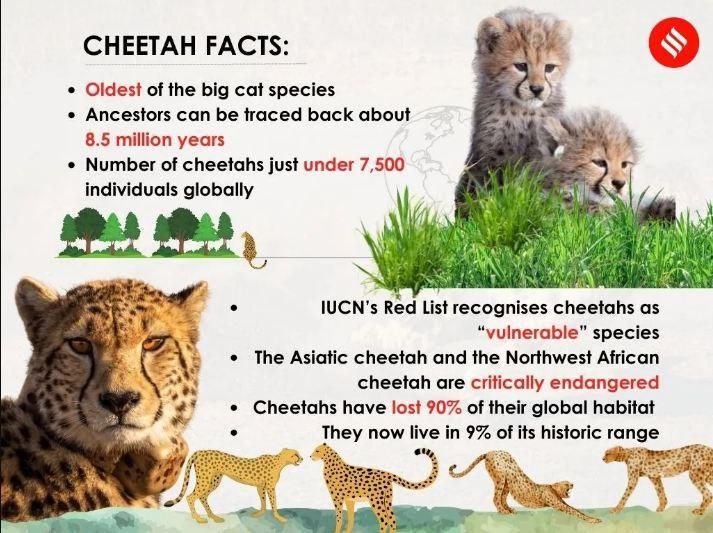
TEXT & CONTEXT: HOW ARE CHEETAHS FARING IN INDIA?
Project Cheetah is India's cheetah relocation programme. The attempt is to, over the next decade; bring in 5-10 animals every year until a self-sustaining population of about 35 cheetahs is established.
TEXT & CONTEXT: HOW ARE CHEETAHS FARING IN INDIA?
Project Cheetah is India's cheetah relocation programme. The attempt is to, over the next decade; bring in 5-10 animals every year until a self-sustaining population of about 35 cheetahs is established.
As of today, 11 of the translocated cheetahs are in the true wild with four specially designed one-square kilometer enclosures called 'bomas'.
Five of the translocated animals and three of four cubs born in India have died.
One of the cheetahs, Surya, was found dead in the Kuno N.P. last week. Veterinarians examining the animal saw wound on his neck, infected with maggots. It was possibly caused by the radio-collar fitted on his neck. The collars were made from polystyrene and equipped with a radio frequency tracking chip that helps monitor the animals.
Radio-collaring is a very common practice in India among tigers, lions, leopards, elephants and never have they been linked to any such infections.
Before this, Tejas was reported dead after being attacked by a female cheetah within the enclosure. In May, three of four cubs died from heat and malnourishment. Two other adults, Sasha and Uday died from renal infection and cardiovascular problems.
However, experts say that cheetah cubs have a very high mortality rate as compared to tigers and lions.
In September, it will be one year since a batch of eight cheetahs from Namibia arrived in India. They were followed by 12 from South Africa in February of 2023. It is argued that keeping cheetahs in extended quarantine has impacted their adaptive capabilities, making them more vulnerable. Unlike tigers and leopards, cheetahs are relatively delicate and are more likely to be fatally injured in the wild.
However, currently Indian cheetahs face no competition from other comparable predators and so it remains to be seen if the animals can successfully establish themselves in India.
